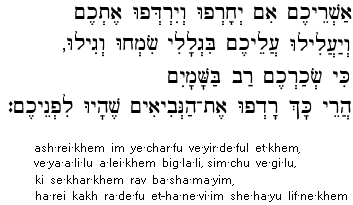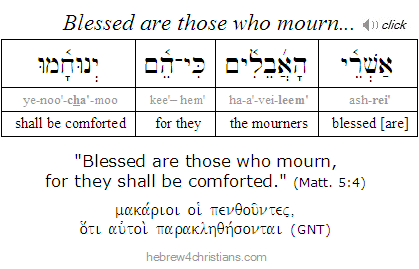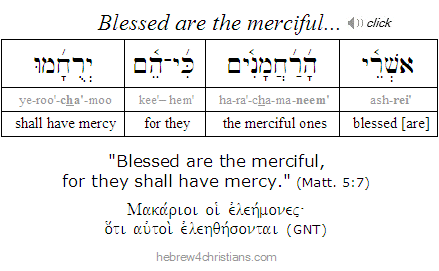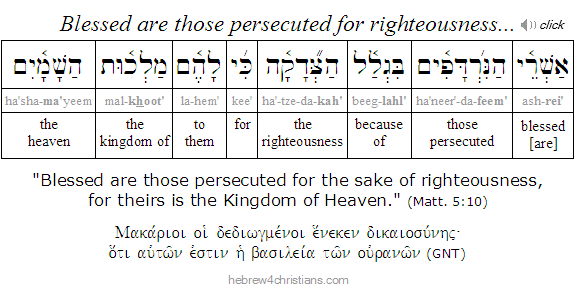|
|

The Jewish Network
| ||||||||||
|
|
Introduction | |||
The Beatitudes of Jesus (Matt. 5:2-12) provide a description of life in the Kingdom of Heaven, since to be in the Kingdom of Heaven means to be comforted, to be accepted, to be satisfied, to be shown mercy, to see God, to be called God's child, and to reign with the Messiah in His glory. Although we tend to think of the Kingdom as something future (and therefore remote), each of these blessings is a present possession for the person of faith (and therefore near). Jesus was not expressing ethical idealism as much as he was revealing the lifestyle of those who trust in Him. |
| ||||||||||||||||||||||||
Μακάριοι οἱ πτωχοὶ τῷ πνεύματι ὅτι αὐτῶν ἐστιν ἡ βασιλεία τῶν οὐρανῶν. |
|
|
The opposite of poverty of spirit is human pride that leads to misery: "O the misery of the proud in spirit, for theirs is the Kingdom of Self." Pride elevates the ego and regards others as a threat to the self's extension and will. Pride is therefore a self-imposed exile, refusing to validate the existence of others and regarding otherness as a menace. |
| |||||||||||||||||||||||
μακάριοι οἱ πενθοῦντες, ὅτι αὐτοὶ παρακληθήσονται. |
This is a paradoxical statement, since those who genuinely mourn are anything but happy (i.e., me'ushar or μακαριος). Indeed, according to the world, such a statement seems illogical and perhaps incoherent. The world says, "Enjoy!" but Mashiach says, "Grieve!" (Luke 6:21, "Blessed are you that weep now"). But taken in light of that "godly sorrow" that results in teshuvah - repentance - such mourning is indeed a necessary step on the way to eternal happiness (2 Cor. 7:10). This is the sorrow that leads to being "educated for eternity" and invests meaning in suffering that the world lacks. As Socrates once said, "the unexamined life is not worth living" (Apology) but the world system does not examine and therefore grieve over the sinful condition of humanity. Those who are awake, however, realize God grieves in love over a lost world. God will comfort such mourners-- the Greek word means "to call along side" (παρακαλέω) for encouragement and strength. |
| |||||||||||||||||||||||
μακάριοι οἱ πραεῖς ὅτι αὐτοὶ κληρονομήσουσιν τὴν γῆν. |
This is a direct quote from Psalm 37:11. The word translated "meek" is πραεις (or πραος), perhaps better rendered as humble or gentle. In the Hebrew text of Psalm 37, the word is anavim (עֲנָוִים), usually translated as "lowly ones" (anavah is the Hebrew word for humility). This word does not suggest weakness, but rather the recognition of one's proper place in the universe before God. It is not self-effacing but rather reality-focused. The meek inherit the earth because they are grounded in the truth of reality... |
| ||||||||||||||||||||||
μακάριοι οἱ πεινῶντες καὶ διψῶντες τὴν δικαιοσύνην ὅτι αὐτοὶ χορτασθήσονται. |
The word translated "hunger" (πειναω) is related to the word for the poor person who toils in order to fight off starvation. It is a word that depicts a deep craving or longing. The word translated "thirst" (διψαω) is an even stronger word that suggests a painful need for water to stay alive. |
| ||||||||||||||||||||
μακάριοι οἱ ἐλεήμονες ὅτι αὐτοὶ ἐλεηθήσονται. |
The pagan Roman world despised pity (as did Nietzsche), whereas the Pharisees related suffering to sin (see Matt. 23:23). Indeed the idea of "karma" -- the idea that suffering is a necessary evil, an immutable consequence for sin (either in this life or a previous one) is an age-old belief. In contrast to these widespread ideas of the day, Jesus instructs that we should show sympathy and lovingkindness to those who are afflicted. |
| ||||||||||||||||||||||||
μακάριοι οἱ καθαροὶ τῇ καρδίᾳ ὅτι αὐτοὶ τὸν θεὸν ὄψονται. |
In Hebraic thinking, the heart (לֵב) includes the mind, emotions, will, and inner life of the self. The heart is the whole person... The pure hearted person has no desire for falsehood (Psalm 24:4) and expresses "singleness of heart" (ἐν ἁπλότητι καρδίας) in their devotion to God (Col. 3:22). King David furthermore wrote, "the commandments of the LORD are pure, enlightening the eyes" (מִצְוַת יהוה בָּרָה מְאִירַת עֵינָיִם). Jesus told us that submitting ourselves to God yields inward purity that will result in a face-to-face (פָּנִים אֶל־פָּנִים) experience of God Himself (1 Cor. 13:12, Rev. 22:4): "and they will see His face" - καὶ ὄψονται τὸ πρόσωπον αὐτοῦ. |
| |||||||||||||||||||||||
μακάριοι οἱ εἰρηνοποιοί ὅτι αὐτοὶ υἱοὶ θεοῦ κληθήσονται. |
The Hebrew word shalom means "wholeness," "completeness," "healing" -- not merely the absence of strife. Shalom implies the positive enjoyment of God and "pleasures forevermore." In Jewish ethical teaching, redifat shalom (רְדִיפַת שָׁלוֹם), "seeking peace," is considered a primary heart quality. Rabbi Hillel is attributed as saying, "Be of the disciples of Aaron, loving peace and pursuing peace" (Pirke Avot 1:2). |
| ||||||||||||||||||||
μακάριοι οἱ δεδιωγμένοι ἕνεκεν δικαιοσύνης |
Note that many Christian commentators add the following verses to complete the eighth beatitude: | ||||||
 | ||||||
μακάριοί ἐστε ὅταν ὀνειδίσωσιν ὑμᾶς καὶ διώξωσιν καὶ εἴπωσιν πᾶν πονηρὸν ῥῆμα καθ ὑμῶν ψευδόμενοι ἕνεκεν ἐμοῦ χαίρετε καὶ ἀγαλλιᾶσθε ὅτι ὁ μισθὸς ὑμῶν πολὺς ἐν τοῖς οὐρανοῖς· οὕτως γὰρ ἐδίωξαν τοὺς προφήτας τοὺς πρὸ ὑμῶν. | ||||||
It is a frightening thought to consider that our faith is so tepid that the wicked do not persecute but simply ignore us. If we are not experiencing some kind of opposition and persecution, it might be a symptom that our faith is weak... | ||||||
This is work in progress... | ||||||
Hebrew for Christians | |||||












No comments:
Post a Comment